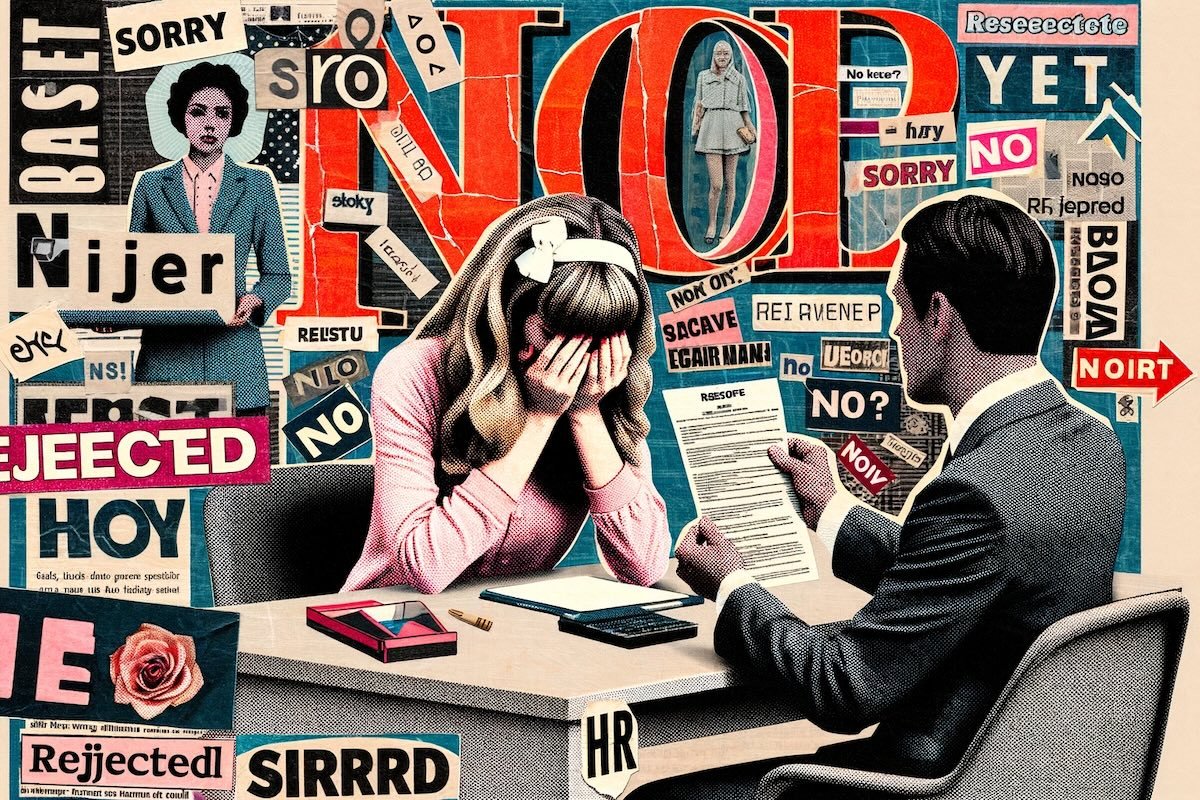Photo by Nataliya Vaitkevich from Pexels
I'm doing everything I can. Why can’t I get a job?
If you’ve been
applying for jobs on LinkedIn every other hour, you undoubtedly understand the frustration of waiting to hear back about a position.
Even if
you’ve landed interviews, spoken to recruiters, and sat through dreaded case studies, you might still not be getting a job offer. Why?
It’s discouraging, especially when
feedback isn’t available, and you’ve spent countless hours prepping for interviews and other aspects of the process.
In this article, we’ll break down the top ten reasons why you didn’t get the job, solutions, and other tips to help you finally land that offer.
10 Reasons You Didn’t Get the Job
So, why aren't you getting the job?
It might be a one-off mistake or an overall
job search strategy that's simply not working. Maybe you're ready to blame the highly competitive job market or the hiring manager who thinks your qualifications just don't cut it. We can help.
1. You Fixated on What the Job Can Do for You
One of the more
common mistakes during the interview process is to focus your conversations on what the job can do for you—how this position will help further your career, how it can give you opportunities other positions cannot, etc.
Solution: What value do you add to the company? What are ways that you would approach the work that set you apart from your peers?
Pro Tip: In focusing on what you bring to the job, don’t forget to mention what the role can do for you! But just shift the central purpose of your conversations to be about you and
what you can provide for the company versus solely what the company can do.
Even if this is your first job or you're only applying for entry-level jobs, create a good first impression by connecting your motivation and eagerness to make a positive impact for the company. The hiring manager already knows this might your first job, but it's not like a recent graduate can't offer them something unique!
2. Recruiters Feel Like You May Not Stay
If
your cv or resume is riddled with multiple job positions that don’t quite relate to one another, it may give off the impression that you’re confused about your career goals.
When people are looking to fill a job position, they often want to train a new employee and equip them with the skills they need to succeed long-term for a few years, at least. So, a wishy-washy resume can be a yellow flag that you're only interested in staying for the short-term while you figure out or explore other job opportunities.
Solution: You need to emphasize why you want this job, how it plays into your long-term goals, and why you plan to stay long-term.
Although this could seem counterintuitive to #1, this is a case where you are not mentioning what the job can do for you and need to reassure your future employers that your job trajectory up until now isn’t what you hope for it to be going forward.
Pro Tip: Focus on transferrable skills that you can bring from previous positions, even if those aren’t directly related to the job you are applying to. Even if it could help your future career trajectory, mention it!
3. You're Giving Non-Verbal Cues
Whether it’s in-person with a weak handshake or avoiding eye contact, or merely on Zoom where you’re not looking at the camera directly or are distracted by other happenings around you,
your non-verbal cues say a lot.
Solution: Fortunately, or unfortunately, the solution to this issue and others are simply to practice. Often, a lot of non-verbal cues that we don’t pick up on are given off due to anxiety.
Working on being comfortable and confident in an interview setting can help your non-verbal cues to match up with your verbal cues.
Pro Tip: Don’t disregard verbal cues like “uh” or “umm” either! That can often be a sign of anxiety that may be off-putting in an interview but at the same time, overconfidence is also not attractive.
So, working on your interview skills can absolutely help build the right level of confidence needed to excel with non-verbal cues.
4. You Didn’t “Click”
It is so, so hard when you leave an interview feeling hopeful, but the team just felt like that “fit” factor wasn’t there. When a team doesn’t think that you might mesh with them, it’s not your fault! But it’s important to take note of if it happens repeatedly.
Solution: Ultimately, it’s difficult to control if people
don’t think you’d be a good fit on their team or in their company culture due to your personality. But it’s also very hard to accurately convey your personality in a short interview span! So, what can you do?
Work with an interviewer or a recruiter to practice relaxing and
being yourself in an interview format. While it sounds counterintuitive, practice being authentic and just work on your interview skills overall so that you can connect and be more “real” from the get-go.
Pro Tip: While it may be controversial, apply for jobs that you aren’t completely interested in just for the experience with job interviews.
Ultimately, practice makes perfect, and being in a real interview setting multiple times will help you to become more authentic and comfortable in an interview environment.
5. You Overshared
Maybe you told a story about how you hate your former boss, lied in your current job, or added personal details that aren’t entirely appropriate for an interview in your conversations.
Solution: While this could have been because you were nervous and overshared accidentally, practice the examples you want to highlight in an interview so that you don’t bring in unwanted details.
Pro Tip: Write down the “script” you want so you can edit out the details that might be considered an overshare.
6. You Were Overqualified
Solution: It sucks to be overqualified for a job but if you are, and you pick up on this during an interview,
go back to the job description and identify what you can look out for in future job listings so that you don’t waste your time applying to position you are overqualified for.
Pro Tip: Ask during the first or second round interviews if you are overqualified or how quickly you can advance in this position if you are so that you don’t waste your own time. Plus, this can help you identify why you might be applying for positions you are overqualified for.
7. You Cast Too Wide of a Net
When you’re anxious about getting a job, it’s common to cast too wide of a net and apply to positions you’re over or underqualified for or simply aren’t clicking with.
Solution: Hone in on the positions, locations, and jobs you’d like to have. Spend some time brainstorming and thinking deeply about what you want from your next career move before you send out more LinkedIn applications. Are you looking for remote work? Are flexjobs or temp jobs a better fit right now? Or maybe you know the industry and need to narrow down your search to industry-specific job boards.
Pro Tip: You can
work with a career coach on this, too, if you’re really struggling! This is absolutely what a career coach is there for and getting in the right mindset while you're applying for jobs will definitely help in your interviews.
8. The Job Description Was Not Accurate
Unfortunately, sometimes a company puts out a job description planning to
hire someone for a specific role and then during the job application process, that changes. Or the person writing the job description just didn’t realize the job they were hiring for. We know— it makes an already annoying job hunt even worse.
Solution: Make it clear in your resume and
cover letter the job that you are qualified and prepared to do so that whoever reviewing it can hopefully not waste your time if they are looking for someone else.
While it’s still frustrating to spend time applying to these jobs, it’s not on you if the company failed to communicate.
Pro Tip: You can work through a recruiter so that this doesn’t happen or add a note to the company that if a position opens up that you would be qualified for, they reach out!
9. Someone Else Was More Qualified
Solution: Nothing you can do, in this case, except apply to more positions and use this experience as motivation to keep working hard and better sell your resume.
Pro Tip: Ask for feedback so you can understand how to negotiate for yourself better in these positions.
10. You Didn’t Tell Enough Stories
If you focused more on the skills, you have and the tasks you completed, you likely didn’t come across as “personable” enough.
Solution: Write down a few stories or experiences you can highlight in an interview and practice telling them.
Pro Tip: If you’re struggling with this, you can work with a
career coach on this, as well.
How to Use This Information To Get a Job
If you have a better understanding of why you're not getting the job—or maybe even that second interview—then you can work backward and try to fix it. When we asked our
career coaches what leads most people to not get job offers even when they
are landing interviews—and they said overall
lack of preparation.
The lack of preparation could relate to researching the job posting, interviewers, and company in-depth, but it could also mean not going the extra mile to practice and prepare your answers to
common interview questions. And your goal isn't just to have answers to these questions—it's to relate your answers to the specific job and company.
Now that you're armed with this list above and have some ideas of how you plan to prep for your next interview a bit differently, there's one more thing you can do to get the job—ask for feedback from the interviewers.
How to Ask Why You Didn’t Get the Job [TEMPLATES]
Now that that’s out of the way, you’re feeling a lot more confident since you know how to correct the few mistakes you might be making in the job application process.
But that still doesn’t make the hours you put into previous applications any more satisfying. Well, what if you could request feedback, after all?
Email Template Asking for Feedback
Dear [Insert Interviewer Name],
Thank you so much for the opportunity to interview for the role of [Position] at [Organization]. While I am disappointed to hear that I will not be moving on to the next round, I appreciate that you let me know in such a timely manner.
I am reaching out to request any feedback you may have for me regarding my interview or application materials. Any observations you would be willing to share will be incredibly helpful for me and my professional growth. Of course, I understand if you don’t have the time to share your thoughts but if able, I would truly appreciate it.
Thank You,
[Name]
Email Template Asking for a Feedback Interview
If you want to ask for feedback, but you want to test the waters first, consider emailing to ask if it'd be okay to speak more at length.
Dear [Insert Interviewer Name],
Thank you so much for the opportunity to interview for the role of [Position] at [Organization]. While I am disappointed to hear that I will not be moving on to the next round, I appreciate that you let me know in such a timely manner.
I am reaching out to request any feedback you may have for me regarding my interview or application materials. Would you be able to hop on a quick 10–15-minute phone call to let me know any observations you may be willing to share? This would be incredibly helpful for my professional growth, and I would truly appreciate you taking out time in your schedule for me.
Let me know when a good time for you is to connect—my schedule is very flexible and I am available at your earliest convenience.
Thank You,
[Name]
Email Template to Say Thank You and Gently Ask for Feedback
We created a few templates because we know it can be uncomfortable to ask for feedback—especially since we are more accustomed to take the "no" and go on.
Let's normalize getting that feedback—seriously!
Dear [Insert Interviewer Name],
Thank you so much for the opportunity to interview for the role of [Position] at [Organization]. While I am disappointed to hear that I will not be moving on to the next round, I appreciate that you let me know in such a timely manner.
Please do keep me in mind if you have any upcoming open positions that you believe I may be qualified for and if you have any feedback regarding my interview or application materials, I would greatly appreciate your observations.
Thank You,
[Name]











